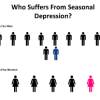- Empty cart.
- Continue Shopping
The Truth About Male Menopause

“Male menopause” is a term often used colloquially to describe age-related changes in men’s hormone levels and associated symptoms. However, it’s important to clarify that the male experience of hormonal changes is not the same as the female menopause.
Understanding Andropause
What Is Andropause?
Andropause refers to the gradual decline in testosterone levels that many men experience as they age, typically beginning in their late 40s or early 50s. Unlike menopause in women, which is characterized by the abrupt cessation of reproductive hormone production, andropause involves a more gradual decline in testosterone over time.
Symptoms of Andropause
The symptoms of andropause can vary widely from one individual to another. Common symptoms include:
- Decreased Libido: A reduced interest in sex and changes in sexual performance can occur.
- Fatigue: Feeling tired or lacking energy is a frequent complaint.
- Mood Changes: Some men may experience mood swings, irritability, or depression.
- Reduced Muscle Mass: A decrease in muscle mass and strength may occur.
- Weight Gain: Some men may gain weight, particularly around the abdominal area.
- Sleep Disturbances: Sleep problems, such as insomnia or disrupted sleep patterns, can be common.
- Decreased Bone Density: Lower testosterone levels can contribute to decreased bone density, potentially leading to osteoporosis.
- Memory and Cognitive Changes: Some men may notice cognitive changes, such as difficulty concentrating or memory problems.
The Truth About “Male Menopause”
1. It’s Not the Same as Female Menopause
While both andropause and female menopause involve hormonal changes, they are distinct processes. Female menopause involves a sharp decline in estrogen and the cessation of menstruation, typically occurring around age 50. Andropause, on the other hand, involves a gradual decline in testosterone levels, and most men continue to produce sperm and remain fertile throughout their lives.
2. It’s Not Universal
Not all men will experience andropause, and the severity of symptoms can vary significantly. Some men may go through this phase with minimal disruption to their daily lives, while others may experience more pronounced symptoms.
3. It’s Not Necessarily a Medical Condition
While andropause is a recognized phenomenon, it is not considered a medical condition in the same way as female menopause. Many of the symptoms associated with andropause are also common to other age-related conditions or lifestyle factors, making it important to consider other potential causes and rule out underlying health issues.
4. Diagnosis and Treatment Are Controversial
Diagnosing andropause can be challenging due to the variability in symptoms and hormone levels among men. Treatment options, such as testosterone replacement therapy, are available but are not without risks and side effects. Before considering treatment, it is essential for men to consult with a healthcare professional to discuss the potential benefits and risks.
In conclusion, “Male menopause,” or andropause, is a term used to describe age-related hormonal changes in men. While it shares some similarities with female menopause, it is not the same and should not be viewed as an exact equivalent. The experience of andropause varies among individuals, and not all men will go through it in the same way or to the same degree.
It’s crucial for men experiencing symptoms associated with andropause to seek medical advice and undergo a thorough evaluation. Many symptoms of andropause can also be attributed to other health conditions, so it’s essential to rule out underlying issues and consider a holistic approach to health and well-being.
Ultimately, understanding the truth about andropause and its potential effects on men’s health empowers individuals to make informed decisions about their well-being and seek appropriate medical guidance when necessary.








